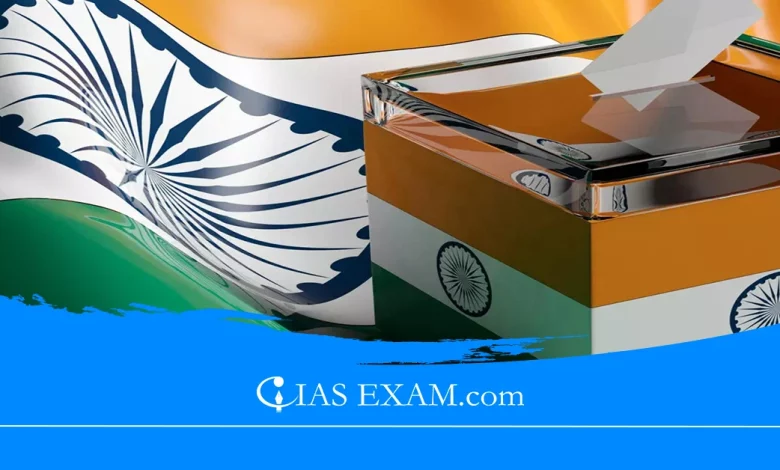Daily Current Affairs for UPSC
Seven-phase Lok Sabha election in India
Syllabus- Polity & Governance [GS Paper-2]

Context
The Election Commission has recently announced a seven-phase Lok Sabha election starting April 19.
About
- Election is the manner by which individuals select, by vote casting, representatives to act on their behalf, to symbolize them, in a legislative body.
- Elections are held on the basis of universal adult franchise, this means that all Indians of 18 years of age and above have the right to vote, irrespective of their caste, colour, religion, sex or place of birth.
- Elections allow each citizen of the country to participate in the process of government formation.
- Prevailing Scenario : Elections are held in India frequently.
- These include elections to elect members of the Lok Sabha, Rajya Sabha, State Legislative Assemblies (Vidhan Sabhas) Legislative Councils (Vidhan Parishad) and of, President and Vice-President of India.
- Elections are also held for local bodies including municipalities, municipal corporations and Panchayati Raj.
- Role of ECI: Election Commission of India is an autonomous constitutional body responsible for administering election processes in India.
- It is a three-member body.
- The principal features of the Election Commission are to delimit the constituencies, understand the political events, allot the symbols, and hire officers to conduct and supervise the elections.
Procedures
- Notification for Election: The system of election officially begins on the advice of the Election Commission, the President in case of Lok Sabha and the Governor in case of State Assembly issue a notification for the election.
- Filing of Nomination Structure of Government: A person who intends to contest an election is needed to file the nomination paper in a prescribed form indicating his name, age, postal address and serial number in the electoral rolls.
- Security Deposit: Every candidate has to make a security deposit on the time of filing nomination.
- Scrutiny and Withdrawal : All nomination papers acquired by the Returning Officer are scrutinised at the day fixed by the Election Commission.
- The applicants also can withdraw their nominations.
- Election Campaign : Campaigning is the process by which a candidate tries to persuade the electorate to vote for him instead of others.
- During this period, the candidates try to travel through their constituency to persuade as many citizens as possible to vote in their favour.
- Model Code of Conduct : During the campaign period the political parties and the contesting applicants are expected to abide by a model code of conduct announced by the Election Commission of India on the idea of the consensus amongst political parties.
- It comes into pressure the moment the agenda of the election is introduced by the Election Commission.
- Polling, Counting and Declaration of Result: In order to conduct polling, a large number of polling booths are set up in each constituency.
- Each booth is placed under the charge of a Presiding Officer with the Polling Officers to help the process.
- The candidate who secures the highest range of votes in a constituency is said to be elected.
Electoral Reforms
- To repair the confidence of the public in the democratic electoral device, many electoral reforms have been endorsed from time to time by the Tarkunde Committee and Goswami Committee, under the chairmanship of the then Chief Election Commissioner, T.N. Seshan.
- Some reforms are: vote casting age has been diminished from 21 years to 18 years.
- Increase in the quantity of security deposit
- Picture identity cards have been introduced
- Introduction of Electronic Voting Machine
Conclusion and Way Forward
- There isn’t any doubt that India needs drastic poll reforms but still the fact remains that Indian elections have been largely free and fair and successfully conducted.
- With the acceptance of adult suffrage, freedom to contest elections, and the established order of an impartial Election Commission, India has attempted to make its election process free and fair.
- It gives the country the proud distinction of being the biggest democracy in the world.
Source: The Indian express
UPSC Mains Practice Questions
Discuss the role of the Election Commission of India in the light of the evolution of the Model Code of Conduct. (2022)





.png)



